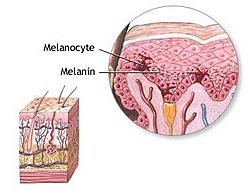Melanocyte facts for kids
Quick facts for kids Melanocyte |
|
|---|---|
 |
|
| Melanocyte and melanin. | |
| Latin | melanocytus |
| MeSH | Melanocytes |
| Code | TH H2.00.03.0.01016 |
Melanocytes are special cells in your body that make a substance called melanin. Melanin is a pigment, which means it's a natural coloring material. It's mostly responsible for the color of your skin, hair, and eyes. These important cells help protect your body from the sun's harmful rays.
Contents
What Are Melanocytes?
Melanocytes are like tiny factories that produce melanin. This melanin is what gives your skin its unique shade, from very light to very dark. It also colors your hair and the iris (the colored part) of your eyes. The amount and type of melanin your melanocytes make determine your natural skin and hair color.
Where Are Melanocytes Found?
You'll find most melanocytes in the bottom layer of your skin's epidermis. The epidermis is the outermost layer of your skin. They are also present in your hair follicles (the tiny sacs that grow hair) and in the iris of your eyes. Some melanocytes are found in other parts of the body too, but they are most noticeable in these areas.
How Do Melanocytes Protect You?
One of the most important jobs of melanocytes is to protect your body from UV radiation that comes from the Sun. When sunlight hits your skin, melanocytes get busy producing more melanin. This melanin acts like a natural shield.
Melanin: Your Body's Natural Sunscreen
Melanin absorbs and scatters UV radiation, stopping it from damaging your cells. UV radiation can harm the DNA inside your cells, which can lead to serious problems like skin damage. By producing melanin, melanocytes help keep your skin healthy and protect it from too much sun exposure. This is why people with more melanin in their skin tend to get sunburned less easily.
How Do Hormones Affect Melanocytes?
Your body has special messengers called hormones. One type, called Melanocyte-Stimulating Hormones (MSH), comes from a small gland in your brain called the pituitary gland. When these MSH hormones are released, they tell your melanocytes to make and release more melanin. This is why your skin might get darker when you spend time in the sun – your body is trying to protect itself by making more melanin!
Images for kids
See also
 In Spanish: Melanocito para niños
In Spanish: Melanocito para niños
 | Lonnie Johnson |
 | Granville Woods |
 | Lewis Howard Latimer |
 | James West |


